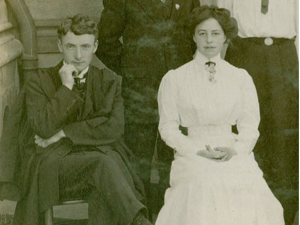Voices from the Women’s Peace Appeal: Kathleen Carpenter, Aberystwyth (1891-1970)
By Catherine Duigan, Professor (Hon.) of Environmental Science, Department of Geography and Earth Science, Aberystwyth University. February 2024.
Address: Bronsiriol, Brynymor Road, Aberystwyth.


Of course Kathleen Carpenter signed The Petition, clearly and confidently with her best fountain pen, as a testament to her loyalty and humanity.
As the daughter of Frances Zimmerman, a German migrant to England, World War One shaped Kathleen’s life and identity.
Alongside future soldiers, she did her undergraduate studies at the University College of Wales Aberystwyth, obtaining her B.Sc. in 1910, afterwards taking the traditional path for women into teaching.
No doubt she would have been aware of the banishment by a mob of Carl Hermann Ethé, a German national and Professor of Oriental Languages at Aberystwyth, in October 1914. The following month a newspaper notice declared that, by deed poll, Kathleen and her sister Bessey had “abandoned” the name of Zimmerman and permanently adopted Carpenter.
In 1916-18 she taught in Birkenhead High School where the girls made felt bootees for soldiers suffering from trench foot, but German continued to be taught. An important naval area, wartime sentiments had already exploded in May 1915 after the sinking of the RMS Lusitania, with German-sounding shops being looted and burned.
In October 1919 Kathleen returned to Aberystwyth to start her M.Sc. studies on the impact of acid mine waters on the ecology of the local rivers. As an assistant lecturer she is likely to have taught war veterans who had a reputation for challenging the status quo.
The Petition’s aspiration to influence foreign policy would have intrigued Kathleen, who eventually left Britain to work in several universities in the USA. There she developed her own links with The American Association of University Women who hosted The Petition deputation in Washington DC.
